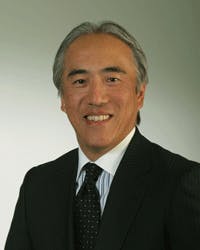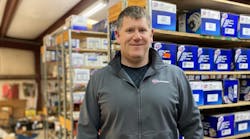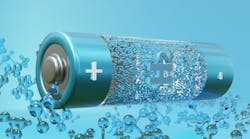As executives at Yokohama Tire Corp. were continuing to assess the impact of the earthquake on access to adequate electrical power and the flow of raw materials to its Japanese facilities, they remained optimistic over the overall state of the tire industry.
Takao Oishi, Yokohama’s president and CEO, says the company “is poised for a promising future.”
He offers an overview:
Will supply for the American tire market come from more than one source?
Yes. I’m proud to say that we have a strong relationship with our parent company, YRC (the Yokohama Rubber Co., Ltd.); they fully support us. In addition to the Salem (Va.) expansion, Yokohama is investing in plants in Thailand and the Philippines to increase production and help bolster our supply in the United States.
Do you think we can expect improvements for the tire industry overall in 2011?
Yes, 2011 will be slightly stronger than 2010, but all tire manufacturers – including Yokohama and its competitors – will face the same problem on supply, as well as the rising costs of raw materials. Remember, the industry really suffered economically in 2008 and 2009. Most companies didn’t invest largely in their factories. Production was cut dramatically. Now that the economy is turning around, all of us are doing our best to catch up quickly. How fast anyone does this will be key to their success.
What would you say were the key drivers in getting through 2009 and 2010?
We’ve always run lean and efficiently, so that helped when the economy slowed down. Our employees tightened up on budgets and worked extra hard to get through the tough times. We also have great communications internally and across the globe with our parent company in Japan, the Yokohama Rubber Co., Ltd. Strong communication is extremely important in making the company operate effectively.
Our product offerings were another factor. We launched new products like the AVID ENVigor consumer tire and the101ZL commercial truck tire, which were received highly by our dealer base. In some ways we did much better than expected, so, unfortunately, we now have a fill rate issue as I mentioned earlier. That’s a pressing priority for us, and the industry as a whole. We want to continue the growth we’ve experienced, so we are pushing our parent company and our Salem plant to increase production as much as possible and as quickly as possible. To help, we’ve invested $13 million to expand production at our Salem plant.
What kind of trends do you see in the marketplace? Do you see an increase in the off-the-road (OTR) market? Commercial? Consumer?
Our research indicates the commercial segment is growing a little faster than the consumer segment at this time. There are more commercial trucks on the road carrying more goods – a very good sign for the economy indeed and the commercial tire market.
Additionally, the commercial segment is becoming more environmentally-aware with initiatives such as the EPA’s SmartWay program. This opens new opportunities as an ever increasing number of fleets require SmartWay-verified tires that are fuel efficient and last longer, which Yokohama already has. We not only save fleets money, but protect the environment as well. We believe being green is an important part of our business.
From zero-waste emission factories in Japan to planting trees at your facilities around the globe with the Forever Forest project to eco-friendly products such as orange oil-infused tires, Yokohama’s been on the forefront of environmentalism and technology. Why?
We are very conscious and respectful about the environment. That’s why it’s a priority in everything we do, from our products to our corporate activities. It’s our corporate policy and it starts at the top with Tadanobu Nagumo, the president of YRC. He believes that as a company and manufacturer, we have a responsibility – an obligation, in fact – to help the environment. Producing the best product is not enough. You have to be a good corporate citizen as well.
Are you surprised when you see some of your competitors producing “green” products?
Obviously, that’s a natural trend. We try to provide our own, unique products, such as the ADVAN ENV-R2 race tire, which is the only race tire with orange oil in it. No other company is using orange oil technology – it’s unique to Yokohama. We believe these kinds of innovations will be key to Yokohama’s growth. We don’t want to just follow what other companies are doing. We want to lead, using our own, proprietary technology and environmental convictions to produce original, signature products.
How large of a role does the focus on technology occupy in Yokohama’s corporate mandate?
Technology is what separates us from other companies, so it forms the very core of our corporate mandate, along with environmentalism. When we produce innovations such as the AIRTEX Advanced Liner, which performs better than the traditional butyl liner – lighter and saves fuel by retaining air better – we differentiate ourselves by providing consumer noticeable benefits they can appreciate. Technology has been Yokohama’s heritage and it will continue to be a cornerstone of our product development in the future.
Is a key strategy in 2011 and beyond to keep reinvesting in the company for future growth?
Yes, of course. Continued reinvestment in technology and new products means we are obsoleting ourselves before our competitors do. This assures us that we are meeting the needs of our customers better. This, in turn, means future growth as customer confidence is made ever stronger.
Does quality beat price?
We know that some people will only buy on price, but overall, we believe quality does beat price. Not only do we beat them on the quality, we also beat them on servicing after the sale. Those things are important to consumers. Let’s not forget to add performance, ride comfort, handling and tread life. It all adds up. In the end, our tires prove their value every day. That’s why these copycat companies don’t threaten us. They may be a little headache, but nothing more. I’m not worried about them.
You’ve been quoted as saying the reasons for Yokohama’s success are good customers and employees.
We are grateful to our customers and want to help them any way we can. As president of Yokohama Tire Corp., I also appreciate everyone who works for YTC. They are our best asset. I always strive to make employees happy by providing a work environment that’s conducive to productivity and personal accomplishment. Happy employees make successful companies. Our company philosophy is “brightly, nicely and actively.”
A couple of years ago, when times were tough, I spoke to our employees about “Katsu,” which means to overcome challenges. I was very pleased because the employees internalized it and we did overcome the challenges to not only meet but surpass our goals. The following year I introduced “Tan,” which is about conditioning one’s strengths. This meant to us becoming a lean company and “trimming the fat” – whether this be in unnecessary expenses or wasteful steps in doing one’s job. This year, I introduced “Zen”, which means to make better. Continuous improvement is a hallmark way of life for Yokohama. Being good enough is not good for us.”
It sounds like you have an effective way to communicate with employees.
Internal communications is critically important to a company. Employees should know how the company is doing and what they can do to contribute. It’s important they know and understand what discipline is called for to succeed. Every month, I relay to all employees what Yokohama is doing as a company.
I want all people to work together and make a commitment. The more involved they are, the more personal it becomes. They become stakeholders. They feel part of it and the company benefits.
For more information, visit www.yokohamatire.com.
As executives at Yokohama Tire Corp. were continuing to assess the impact of the earthquake on access to adequate electrical power and the flow of raw materials to its Japanese facilities, they remained optimistic over the overall state of the tire industry.
Takao Oishi, Yokohama’s president and CEO, says the company “is poised for a promising future.”
He offers an overview:
Will supply for the American tire market come from more than one source?
Yes. I’m proud to say that we have a strong relationship with our parent company, YRC (the Yokohama Rubber Co., Ltd.); they fully support us. In addition to the Salem (Va.) expansion, Yokohama is investing in plants in Thailand and the Philippines to increase production and help bolster our supply in the United States.
Do you think we can expect improvements for the tire industry overall in 2011?
Yes, 2011 will be slightly stronger than 2010, but all tire manufacturers – including Yokohama and its competitors – will face the same problem on supply, as well as the rising costs of raw materials. Remember, the industry really suffered economically in 2008 and 2009. Most companies didn’t invest largely in their factories. Production was cut dramatically. Now that the economy is turning around, all of us are doing our best to catch up quickly. How fast anyone does this will be key to their success.
What would you say were the key drivers in getting through 2009 and 2010?
We’ve always run lean and efficiently, so that helped when the economy slowed down. Our employees tightened up on budgets and worked extra hard to get through the tough times. We also have great communications internally and across the globe with our parent company in Japan, the Yokohama Rubber Co., Ltd. Strong communication is extremely important in making the company operate effectively.
Our product offerings were another factor. We launched new products like the AVID ENVigor consumer tire and the101ZL commercial truck tire, which were received highly by our dealer base. In some ways we did much better than expected, so, unfortunately, we now have a fill rate issue as I mentioned earlier. That’s a pressing priority for us, and the industry as a whole. We want to continue the growth we’ve experienced, so we are pushing our parent company and our Salem plant to increase production as much as possible and as quickly as possible. To help, we’ve invested $13 million to expand production at our Salem plant.
What kind of trends do you see in the marketplace? Do you see an increase in the off-the-road (OTR) market? Commercial? Consumer?
Our research indicates the commercial segment is growing a little faster than the consumer segment at this time. There are more commercial trucks on the road carrying more goods – a very good sign for the economy indeed and the commercial tire market.
Additionally, the commercial segment is becoming more environmentally-aware with initiatives such as the EPA’s SmartWay program. This opens new opportunities as an ever increasing number of fleets require SmartWay-verified tires that are fuel efficient and last longer, which Yokohama already has. We not only save fleets money, but protect the environment as well. We believe being green is an important part of our business.
From zero-waste emission factories in Japan to planting trees at your facilities around the globe with the Forever Forest project to eco-friendly products such as orange oil-infused tires, Yokohama’s been on the forefront of environmentalism and technology. Why?
We are very conscious and respectful about the environment. That’s why it’s a priority in everything we do, from our products to our corporate activities. It’s our corporate policy and it starts at the top with Tadanobu Nagumo, the president of YRC. He believes that as a company and manufacturer, we have a responsibility – an obligation, in fact – to help the environment. Producing the best product is not enough. You have to be a good corporate citizen as well.
Are you surprised when you see some of your competitors producing “green” products?
Obviously, that’s a natural trend. We try to provide our own, unique products, such as the ADVAN ENV-R2 race tire, which is the only race tire with orange oil in it. No other company is using orange oil technology – it’s unique to Yokohama. We believe these kinds of innovations will be key to Yokohama’s growth. We don’t want to just follow what other companies are doing. We want to lead, using our own, proprietary technology and environmental convictions to produce original, signature products.
How large of a role does the focus on technology occupy in Yokohama’s corporate mandate?
Technology is what separates us from other companies, so it forms the very core of our corporate mandate, along with environmentalism. When we produce innovations such as the AIRTEX Advanced Liner, which performs better than the traditional butyl liner – lighter and saves fuel by retaining air better – we differentiate ourselves by providing consumer noticeable benefits they can appreciate. Technology has been Yokohama’s heritage and it will continue to be a cornerstone of our product development in the future.
Is a key strategy in 2011 and beyond to keep reinvesting in the company for future growth?
Yes, of course. Continued reinvestment in technology and new products means we are obsoleting ourselves before our competitors do. This assures us that we are meeting the needs of our customers better. This, in turn, means future growth as customer confidence is made ever stronger.
Does quality beat price?
We know that some people will only buy on price, but overall, we believe quality does beat price. Not only do we beat them on the quality, we also beat them on servicing after the sale. Those things are important to consumers. Let’s not forget to add performance, ride comfort, handling and tread life. It all adds up. In the end, our tires prove their value every day. That’s why these copycat companies don’t threaten us. They may be a little headache, but nothing more. I’m not worried about them.
You’ve been quoted as saying the reasons for Yokohama’s success are good customers and employees.
We are grateful to our customers and want to help them any way we can. As president of Yokohama Tire Corp., I also appreciate everyone who works for YTC. They are our best asset. I always strive to make employees happy by providing a work environment that’s conducive to productivity and personal accomplishment. Happy employees make successful companies. Our company philosophy is “brightly, nicely and actively.”
A couple of years ago, when times were tough, I spoke to our employees about “Katsu,” which means to overcome challenges. I was very pleased because the employees internalized it and we did overcome the challenges to not only meet but surpass our goals. The following year I introduced “Tan,” which is about conditioning one’s strengths. This meant to us becoming a lean company and “trimming the fat” – whether this be in unnecessary expenses or wasteful steps in doing one’s job. This year, I introduced “Zen”, which means to make better. Continuous improvement is a hallmark way of life for Yokohama. Being good enough is not good for us.”
It sounds like you have an effective way to communicate with employees.
Internal communications is critically important to a company. Employees should know how the company is doing and what they can do to contribute. It’s important they know and understand what discipline is called for to succeed. Every month, I relay to all employees what Yokohama is doing as a company.
I want all people to work together and make a commitment. The more involved they are, the more personal it becomes. They become stakeholders. They feel part of it and the company benefits.
For more information, visit www.yokohamatire.com.


